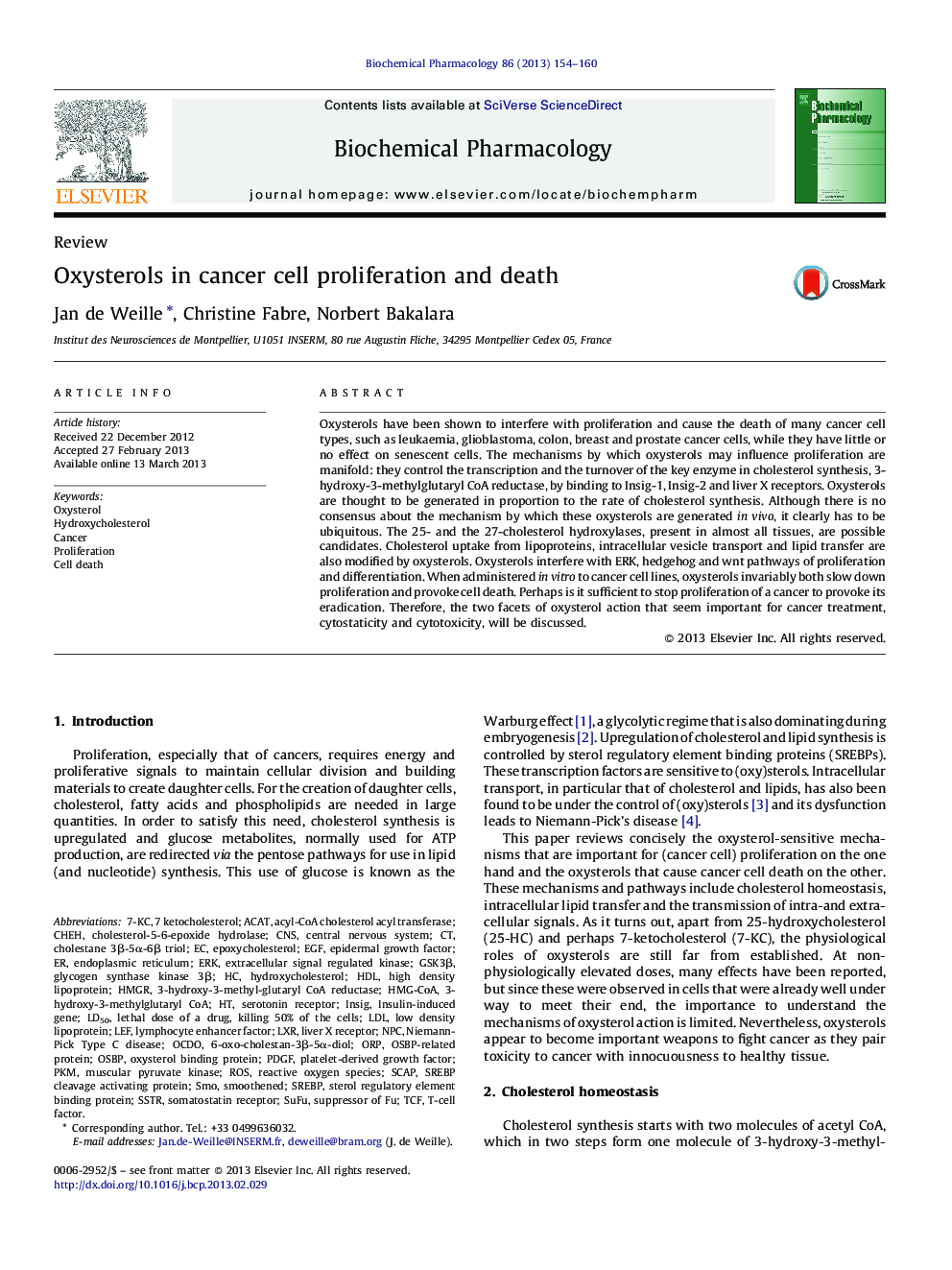| کد مقاله | کد نشریه | سال انتشار | مقاله انگلیسی | نسخه تمام متن |
|---|---|---|---|---|
| 5823765 | 1118353 | 2013 | 7 صفحه PDF | دانلود رایگان |
عنوان انگلیسی مقاله ISI
Oxysterols in cancer cell proliferation and death
ترجمه فارسی عنوان
اکسسترل در تکثیر و مرگ سلول های سرطانی
دانلود مقاله + سفارش ترجمه
دانلود مقاله ISI انگلیسی
رایگان برای ایرانیان
کلمات کلیدی
SMOPDGFSSTRHMG-CoANPCGSK3βPKMSufuACATTCFERKOSBPLXRSREBPHMGR3-hydroxy-3-methylglutaryl CoAHDLSCAP7-KCORPOSBP-related proteinLD50SREBP cleavage activating proteinEGFOCDOlymphocyte enhancer factorROS - ROSEpoxycholesterol - اپوکسی کلسترولOxysterol - اکسسترلNiemann-Pick type C disease - بیماری Niemann-Pick نوع CInsig - بینشProliferation - ترویجCNS - دستگاه عصبی مرکزیCancer - سرطانcentral nervous system - سیستم عصبی مرکزیextracellular signal regulated kinase - سیگنال خارج سلولی kinase را تنظیم می کندendoplasmic reticulum - شبکه آندوپلاسمی Smoothened - صافT-cell factor - عامل T-cellepidermal growth factor - عامل رشد اپیدرمیplatelet-derived growth factor - فاکتور رشد حاصل از پلاکتLef - لفhigh density lipoprotein - لیپوپروتئین با چگالی بالاlow density lipoprotein - لیپوپروتئین چگالی کمLDL - لیپوپروتئین کم چگالی(کلسترول بد)Cell death - مرگ سلولی hydroxycholesterol - هیدروکسی کلسترولoxysterol binding protein - پروتئین اتصال اکسسترینsterol regulatory element binding protein - پروتئین اتصال دهنده عصاره استرولChEH - چیهinsulin-induced gene - ژن ناشی از انسولینliver X receptor - کبد X گیرندهGlycogen synthase kinase 3β - گلیکوزین سنتاز کیناز 3βReactive oxygen species - گونههای فعال اکسیژنSerotonin receptor - گیرنده سروتونینSomatostatin receptor - گیرنده سوماتوستاتین
موضوعات مرتبط
علوم پزشکی و سلامت
داروسازی، سم شناسی و علوم دارویی
داروشناسی
چکیده انگلیسی
Oxysterols have been shown to interfere with proliferation and cause the death of many cancer cell types, such as leukaemia, glioblastoma, colon, breast and prostate cancer cells, while they have little or no effect on senescent cells. The mechanisms by which oxysterols may influence proliferation are manifold: they control the transcription and the turnover of the key enzyme in cholesterol synthesis, 3-hydroxy-3-methylglutaryl CoA reductase, by binding to Insig-1, Insig-2 and liver X receptors. Oxysterols are thought to be generated in proportion to the rate of cholesterol synthesis. Although there is no consensus about the mechanism by which these oxysterols are generated in vivo, it clearly has to be ubiquitous. The 25- and the 27-cholesterol hydroxylases, present in almost all tissues, are possible candidates. Cholesterol uptake from lipoproteins, intracellular vesicle transport and lipid transfer are also modified by oxysterols. Oxysterols interfere with ERK, hedgehog and wnt pathways of proliferation and differentiation. When administered in vitro to cancer cell lines, oxysterols invariably both slow down proliferation and provoke cell death. Perhaps is it sufficient to stop proliferation of a cancer to provoke its eradication. Therefore, the two facets of oxysterol action that seem important for cancer treatment, cytostaticity and cytotoxicity, will be discussed.
ناشر
Database: Elsevier - ScienceDirect (ساینس دایرکت)
Journal: Biochemical Pharmacology - Volume 86, Issue 1, 1 July 2013, Pages 154-160
Journal: Biochemical Pharmacology - Volume 86, Issue 1, 1 July 2013, Pages 154-160
نویسندگان
Jan de Weille, Christine Fabre, Norbert Bakalara,
